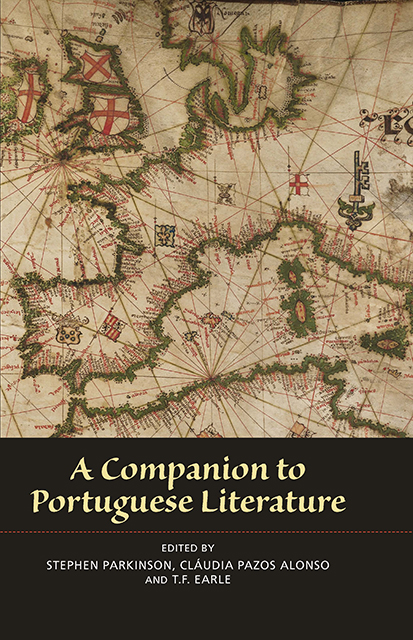Book contents
- Frontmatter
- Contents
- Acknowledgements
- Notes on the Contributors
- Introduction
- 1 Eight Centuries of Portuguese Literature: An Overview
- 2 The Medieval Galician-Portuguese Lyric
- 3 Fernão Lopes and Portuguese Prose Writing of the Middle Ages
- 4 Portuguese Theatre in the Sixteenth Century: Gil Vicente and António Ferreira
- 5 The Lusiads and the Literature of Portuguese Overseas Expansion
- 6 Lyric Poetry in the Sixteenth Century
- 7 The Seventeenth Century
- 8 The Eighteenth Century
- 9 Almeida Garrett: Founder of Modern Portuguese Literature
- 10 The Transition from Romanticism to Realism: Alexandre Herculano, Camilo Castelo Branco and Júlio Dinis
- 11 Eça de Queirós: A European Writer
- 12 Fernando Pessoa and the Modernist Generation
- 13 Narrative and Drama during the Dictatorship
- 14 Women Writers up to 1974
- 15 Writing after the Dictatorship
- 16 Portuguese Literature in English Translation
- Index
5 - The Lusiads and the Literature of Portuguese Overseas Expansion
Published online by Cambridge University Press: 03 March 2023
- Frontmatter
- Contents
- Acknowledgements
- Notes on the Contributors
- Introduction
- 1 Eight Centuries of Portuguese Literature: An Overview
- 2 The Medieval Galician-Portuguese Lyric
- 3 Fernão Lopes and Portuguese Prose Writing of the Middle Ages
- 4 Portuguese Theatre in the Sixteenth Century: Gil Vicente and António Ferreira
- 5 The Lusiads and the Literature of Portuguese Overseas Expansion
- 6 Lyric Poetry in the Sixteenth Century
- 7 The Seventeenth Century
- 8 The Eighteenth Century
- 9 Almeida Garrett: Founder of Modern Portuguese Literature
- 10 The Transition from Romanticism to Realism: Alexandre Herculano, Camilo Castelo Branco and Júlio Dinis
- 11 Eça de Queirós: A European Writer
- 12 Fernando Pessoa and the Modernist Generation
- 13 Narrative and Drama during the Dictatorship
- 14 Women Writers up to 1974
- 15 Writing after the Dictatorship
- 16 Portuguese Literature in English Translation
- Index
Summary
The new age of the Renaissance was characterised by three important factors: the systematisation of existing Western learning and aesthetics, the emergence of a canon of literary doctrine and the growing recognition of Europe's coming role in a wider world. Linked to these was the demand, which in the sixteenth century grew to a noisy clamour, that the great realities of man's achievements should be immortalised in verse. It is within this vast context that we shall examine the contribution of Luís Vaz de Camões (1524–80) in Os Lusíadas (The Lusiads, i.e., the Portuguese). This late-Renaissance or Mannerist epic of 1572 celebrates Vasco da Gama's discovery of the searoute to India in 1498, itself one of the major events of the new age, especially in that it achieved what Columbus had failed to do, namely to reach the Orient by sea. That contribution is particularly relevant under four headings: (i) literary theory, (ii) Neoplatonism, (iii) the humanism of reform, and (iv) political thought.
The literary theory of the fifteenth and sixteenth centuries was dominated by a conflation of the precepts of Aristotle's Poetics and Horace's Ars poetica (The Art of Poetry), though the former was not truly understood till the seventeenth century, and though its influence on the composition of Os Lusíadas may legitimately be doubted. There were, however, two significant modifications: the first was a firmly stated preference for epic poetry over tragedy; the second was a preference for the modalities of Virgil's Aeneid over those of Homeric epic. The primordial expression of this consensus came from the pen of an Italian cleric, Girolamo Vida, in his De arte poetica (1527, The Art of Poetry). We have no idea whether Camões had resort to this manual, but, if he had not, then the end-product in Os Lusíadas is a remarkable coincidence. Certainly, the overall structure of the work and the nature and sequence of the episodes are closely modelled on the recommended Aeneid, with flashback narrations of Portuguese history corresponding to Virgil's account of the Trojan War. Just as Aeneas relates those events to Dido in Carthage, so, in Cantos III and IV, Gama recounts his nation's past to the friendly Sheikh of Malindi in East Africa.
- Type
- Chapter
- Information
- A Companion to Portuguese Literature , pp. 72 - 84Publisher: Boydell & BrewerPrint publication year: 2009
- 1
- Cited by



